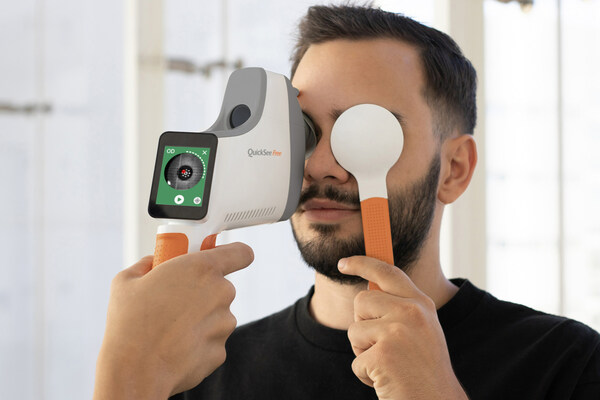PlenOptika´s new autorefractor QuickSee Free receives the Silmo d´or prize in Paris

QuickSee Free, a new handheld wavefront aberrometry-powered autorefractor from PlenOptika, was named winner in the Material & Equipment category of the 30th SILMO D’Or awards in Paris on Saturday, September 30.
“This is a reward for a lot of innovation and work,” said Rodolphe Tessé, President of Saargos, PlenOptika’s distribution partner in France. “PlenOptika shares our values to bring better vision to people through technology.”

QuickSee Free is PlenOptika’s new medical device designed to make accurate objective refraction measurements—the critical for accurate eyeglass and contact lens prescriptions—more accessible. “We designed QuickSee Free to help you, the opticians, optometrists, and ophthalmologists, improve your care for your patients and customers in your stores, hospitals, and clinics,” said Shivang Dave, PlenOptika CEO, upon receiving the award. “But also so you can transform how you reach people who might be not able to reach you. We’re hoping this helps you continue to reach everyone in the world.”
The SILMO D’Or Prizes are given each year at the SILMO international optics and eyewear exhibition, which is attended by more than 34,000 people. The prize recognizes the excellence, creativity, and innovation of manufacturers and brands from all around the world. In addition to the equipment category, prizes are given for lenses, children’s eyewear, eyewear technology innovation, sunglasses brands and designers, eyewear frame brands and designers, and sport and protective eyewear.
“This is such an amazing event,” said Dave. “We’re honored to be a part of the innovation exhibited here.”
Uncorrected refractive error, which can be treated with inexpensive eyeglasses, affects about 33 million people in the United States, and 1.1 billion people globally. PlenOptika designs technologies that replace outmoded legacy technology and address the critical shortage of trained professionals to meet the exam demand. QuickSee Free’s accuracy and ease of use enable task-shifting to trained operators, expanding workforce capacity, enabling new care modes in private practice and large scale clinical enterprises as well as in community and global health initiatives.
The technology development for QuickSee Free was supported in part by a grant from the NASA-supported Translational Research Institute for Space Health (TRISH), which leads a national effort to translate cutting edge emerging terrestrial biomedical research and technology development into applied space flight human risk mitigation strategies for human exploration missions.
More info link



